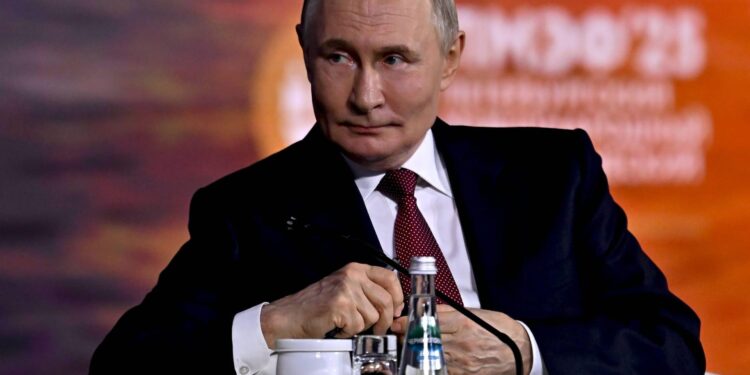Russian President Vladimir Putin has delivered a stark assessment of global tensions amid ongoing conflicts involving Israel, Iran, and Ukraine, warning of the escalating risk that the world could be sliding toward a third world war. In remarks reported by Reuters, Putin addressed the complex geopolitical dynamics fueling instability, emphasizing the dangers posed by intensified rivalries and military engagements. As disputes deepen across multiple fronts, his comments underscore growing international concerns about the potential for a broader, more devastating conflict.
Putin’s Stance on Israel Iran Conflict Signals Heightened Geopolitical Tensions
Russian President Vladimir Putin’s recent remarks regarding the escalating conflict between Israel and Iran have sharply underscored Moscow’s strategic interests in the Middle East amid an already volatile global landscape. In a rare public statement, Putin emphasized the need for restraint while implicitly backing Iran’s right to defend its sovereignty, a stance that signals Moscow’s growing alignment with Tehran despite longstanding ties with Israel. This nuanced position reflects a broader recalibration of Russia’s foreign policy priorities, especially as tensions in Ukraine continue to dominate headlines, creating a delicate balancing act that could have profound implications for regional stability and global diplomacy.
Analysts suggest that Putin’s approach serves multiple geopolitical objectives, including:
- Strengthening alliances: Deepening ties with Iran to counterbalance US influence in the region.
- Projecting power: Demonstrating Russia’s role as a key global arbitrator amid Middle Eastern conflicts.
- Deflecting pressure: Using Middle East tensions to draw international focus away from Ukraine-related sanctions and diplomatic isolation.
| Factor | Impact |
|---|---|
| Israel-Iran tensions | Potential escalation into broader regional conflict |
| Russia’s Ukraine conflict | Diverts Western attention and resources |
| Global Diplomacy | Increased uncertainty and risk of miscalculations |
Analyzing Russia’s Position on Ukraine Amid Escalating Global Unrest
As tensions escalate on multiple fronts, Russia continues to assert a strategic stance that blends assertive diplomacy with military posturing. Moscow’s approach toward Ukraine is marked by claims of defending Russian-speaking populations and countering what it describes as NATO’s eastward expansion. Meanwhile, President Putin’s commentary on the Israel-Iran conflict underscores Moscow’s attempt to position itself as a critical powerbroker amid regional volatility. This dual focus highlights Russia’s broader objective: to maintain influence in Eurasia and the Middle East while challenging Western dominance. Observers note that Russia’s rhetoric and actions contribute to a complex geopolitical environment where miscalculations could accelerate global instability.
The evolving situation is further complicated by the potential for unintended escalation. Analysts emphasize several key factors shaping Russia’s stance:
- Military deployments: Enhanced troop presence near Ukraine’s borders signals readiness without full-scale invasion.
- Diplomatic maneuvers: Engagement with parallel conflicts, such as in the Middle East, seeks to dilute Western focus.
- Information warfare: Robust propaganda campaigns aim to influence domestic and international narratives.
| Aspect | Russia’s Recent Actions | Potential Implications |
|---|---|---|
| Border Activity | Troop build-up and military exercises | Heightened alertness among NATO members |
| Diplomatic Engagements | Calls for talks on Middle East conflicts | Attempt to redirect global attention |
| Media Strategy | State-controlled narratives supporting Russian claims | Domestic cohesion, external influence |
Experts Warn on Preventing World War Three Amid Rising International Confrontations
Leading geopolitical analysts emphasize the critical need for diplomatic engagement as global tensions escalate over hotspots in the Middle East and Eastern Europe. Discussions surrounding Israel and Iran’s ongoing confrontations alongside the protracted conflict in Ukraine have raised alarms about an unpredictable chain reaction that could potentially spark a broader, more devastating war. Experts stress that without cautious, multilateral negotiation processes, the risk of miscalculation or unintended escalation remains alarmingly high.
Key strategies recommended by specialists include:
- Strengthening communication channels between major powers to ease misunderstandings.
- Reinforcing existing international agreements and promoting new frameworks for conflict resolution.
- Encouraging regional de-escalation through targeted peacebuilding initiatives.
- Enhancing transparency in military movements to prevent accidental clashes.
| Region | Potential Flashpoints | Recommended Action |
|---|---|---|
| Middle East | Israel-Iran Tensions | Diplomatic Talks & Arms Control |
| Eastern Europe | Ukraine Conflict | Ceasefire Monitoring & Peace Talks |
| Global Powers | Military Alliances | Conflict De-escalation Protocols |
The Way Forward
As tensions continue to mount on multiple fronts, Vladimir Putin’s recent comments underscore the precarious state of global affairs. With the conflicts in Ukraine and the escalating Israel-Iran rivalry casting long shadows, the risk of a broader confrontation remains a pressing concern for world leaders and international observers alike. As diplomatic efforts persist, the international community faces the urgent task of navigating these complex challenges to prevent any potential slide towards a wider war. Reuters will continue to monitor developments closely.
















